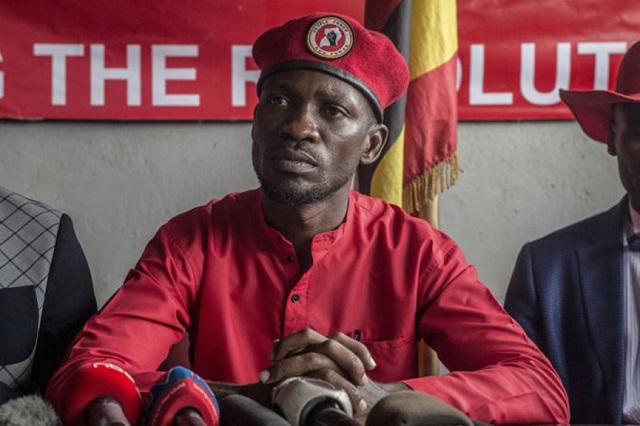
How People Power, JEEMA, FDC are uniting against Museveni
THE INDEPENDENT | ISAAC KHISA | The steps President Yoweri Museveni and his government have taken to contain the coronavirus disease COVID-19 pandemic will make a big difference in the upcoming 2021 general elections. But to whose advantage?
Watching these events, many political observers that spoke to The Independent say opposition politicians appear to have been pushed out of the spotlight by the ruling National Resistant Movement (NRM) candidates including President Museveni
But People Power Group leader and Kyadondo East MP Robert Kyagulanyi aka Bobi Wine appears determined to reawaken the political contest. On June.02 he unveiled two teams that comprised an Electoral Management Committee and a Mobilisation Committee to oversee the election preparation affairs of the pressure group.
The leading opposition party, the Forum for democratic Change (FDC), is determined to the same, according to party spokesperson, Ibrahim Ssemujju Nganda who is the Kira Municipality MP.
At the moment, according to a roadmap by the national Electoral Commission, the political parties are supposed to be concluding their National Delegates’ Conferences and electing their flag bearers ahead of parliamentary and presidential nominations that were slated for Aug.12 and Aug.20, 2020.
And, although the Electoral Commission had announced that the presidential and parliamentary elections to be held anywhere between January 11 and February 9, 2021, the plan now hangs in balance due to the pandemic.
Before coronavirus was recorded in Uganda, prospective political contenders were in high gear galvanizing support in preparation for the presidential, parliamentary, and local government elections.
By early March this year, 24 presidential aspirants had already declared their intention to run for president and notified the Electoral Commission of their plan to start consultation.
President Museveni, who has been in power for the last 34 years, had also shifted to 2021 election campaign gear.
But this came to an abrupt halt in March this year when the first coronavirus case was recorded in the country and subsequently the government instituted strict health and safety measures. The government banned gatherings of more than five people; including political ones, introduced social distancing, stay home directives, and national lockdowns to deal with the pandemic. Political party activity and formations that were conducting consultations in preparation for elections were stopped in their tracks.
But these COVID-19 containment measures also helped President Museveni to rebuild his election infrastructure, says Godber Tumushabe, a political commentator and Associate Director at the Great Lakes Institute for Strategic Studies.
He says combating COVID-19 has handed Museveni a free-hand to deploy the military, Local Defence Units (LDUs) and the Resident District Commissioners (RDCs) which have in the past elections been criticised for involvement in the elections.
He says also that due to COVID-19, all pieces of legislation relating to the upcoming general elections – which would potentially have contributed to creating a leveled ground for the political competitors – have not been presented to President Museveni for assent.
These proposed laws include; The Presidential Elections Amendment Bill 2019, Parliamentary Elections Amendment Bill 2019, Electoral Commission Amendment Bill, and the Political Parties and Organisations Amendment Bill 2019.
Tumushabe says President Museveni has also used the COVID-19 to invoke the spirit of militarism during his routine pandemic updates by constantly comparing it to his five-year rebel war in Luwero which he won to become president. Tumushabe says this is an early election campaign strategy when the country is fighting a different enemy.
“(The addresses) have been more campaigning than about the pandemic,” Tumushabe said on one of the country’s radio talk shows.
However, other commenter’s say there’s was nothing that the government would have done in the pandemic fight, other than engaging in protecting the lives of the population.
As of June.04, the country has 507 C0VID-19 confirmed cases, with 82 recoveries and no death, according to the health ministry.
This development, however, comes even as President Yoweri Museveni repeatedly states that the decision to hold 2021 elections will depend on the advice of the scientists working to contain the Covid-19 pandemic.
President Museveni, who delivered the message on the effects of COVID-19 to the Inter-party Organisation for Dialogue (IPOD) meeting where Justice Forum (Jeema) took over its leadership from the Forum for Democratic Change (FDC) party recently, says major electoral activities have been affected by the COVID-19 pandemic, and the electoral calendar has been greatly disrupted. Museveni’s message was delivered by the NRM Secretary General, Justine Lumumba.
“We in NRM are political players. We cannot take a decision and say elections will be at this time without the advice of the scientists. All the presidential directives that have been given so far have been based on the advice of scientists,” she said.
“Equally when it comes to elections, it will depend on the numbers of Covid-19 patients as the tests go on and also most importantly the advice of scientist,” she added.
Following Museveni’s cue, the Electoral Commission Chairperson, Justice Simon Byabakama, now says the Commission is looking at all possible options available and at an appropriate time, will inform the nation its position with regard to the 2021 General Election.
But many political party leaders The Independent has spoken to say they are going ahead with preparations for the 2021 elections with or without Museveni and the Electoral Commission attempting to create uncertainty.
 The Independent Uganda: You get the Truth we Pay the Price
The Independent Uganda: You get the Truth we Pay the Price






We Ugandans we need change by all men’s
For u talking about election atleast u talk about reopen of school i’m sorry that u are demand election where is the money for conduct election